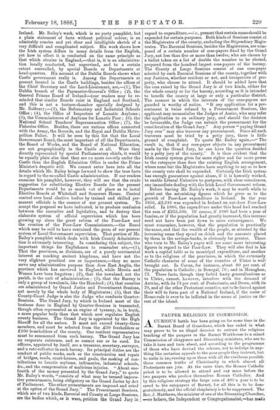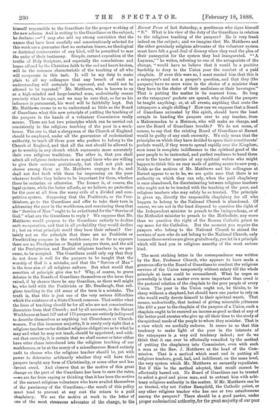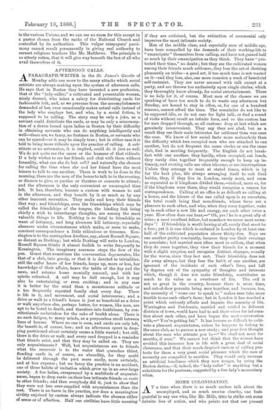PAUPER RELIGION IN COMMISSION.
A battle has been going on for some time in the- Barnet Board of Guardians, which has ended in what may prove to be an illegal decision to entrust the religious teaching of the paupers in the Barnet Workhouse to a mixed Commission of clergymen and Dissenting ministers, who are to. take it turn and turn about, and according to the programme of those who have devised the scheme, not to indulge in any- thing like sectarian appeals to the poor people they instruct, but to unite in impressing upon them with all the vividness possible- those common truths of Christianity in which almost all. Protestants can join. At the same time, the Roman Catholic priest is to be allowed to attend and say mass before the two paupers who profess themselves Roman Catholics. And by this religions strategy the large sum of £80 a year is to be saved to the ratepayers of Barnet, for all this is to be done gratuitously, and the official chaplaincy is to be suppressed. The Rev. J. Matthews, the minister of one of the Dissenting Churches, —we believe, the Independent or Congregationalist,—hae ma
himself responsible to the Guardians for the proper working of the new scheme. And in writing to the Guardians on the subject, he declares :—" I may also add my strong conviction that the names that have been carefully and conscientiously selected for this work are a guarantee that no sectarian biases, no theological or doctrinal controversies of any kind, will be permitted to mar the unity of their testimony. Simple, earnest exposition of the truths of Holy Scripture, and especially the consolations and hopes offered by the Christian faith to the sad and heart-broken, will be the common characteristic of the teaching of all who will co-operate in this task. It will be my duty to make plain to all my colleagues that any breach of such an understanding will certainly he reproved, and would not be allowed to be repeated." Mr. Matthews, who is known to us as a high-minded and large-hearted man, undoubtedly means precisely what he says, and we may be sure that, so far as his influence is paramount, his word will be faithfully kept. But Mr. Matthews seems to us to understand as little as the Board of Guardians what this new principle of putting the teaching of the paupers in the hands of a volunteer Commission really means. There are but two principles which can be carried out consistently in the religious teaching of the poor in a work- house. The one is, that a clergyman of the Church of England should be employed, under all the guarantees of ecclesiastical authority, to teach all those poor who profess to belong to the Church of England, and that all the rest should be allowed to go to worship in any church which represents more accurately their own religions traditions. The other is, that you shall admit all religious instructors on an equal basis who are willing to give their services gratuitously, but shall not pick and choose among them as Mr. Matthews engages to do, and shall not find fault with them for impressing on the poor whatever truths they believe to be important for them, whether these be sectarian or otherwise. The former is, of course, the legal system, while the latter affords, as we believe, no protection for the poor at all from the many evils of a divided and com- petitive system. Supposing that the Positivists, or the Free- thinkers, go to the Guardians and offer to take their turn in addressing the poor in the workhouse, and convincing them that the " Service of Man " ought to be substituted for the " Service of God," what are the Guardians to reply ? We suppose that Mr. Matthews would propose to the Guardians entirely to decline such co-operation, and that in all probability they would decline it ; but on what principle could they base their refusal? Cer- tainly not on the principle that there are no Positivist or Freethinking paupers in the workhouse; for so far as appears there are no Presbyterian or Baptist paupers there, and the aid of the Presbyterian and Baptist religious teachers is, we pre- sume, to be accepted. The Guardians could only say that they do not deem it well for the paupers to be taught that the worship of God is a mistake, and that the "Service of Man" is the true aim of all religious culture. But what would that
assertion of principle give rise to Why, of course, to grave debates in the Boards of Guardians themselves on the issue thus raised, if by chance there be any Guardian, as there well might be, who held with the Positivists or Mr. Bradlaugh, that reli- gious teaching in the old sense of the term is a mistake. The truth is, that this is just one of the very serious difficulties which the existence of a State Church removes. That settles what the lines of teaching should be for all who are not conscientious dissenters from that Church ; and by all accounts, in the Barnet Workhouse at least 167 out of 173 paupers are entirely indisposed to describe themselves as anything but Churchmen or Church- women. For this immense majority, it is surely only right that a religious teacher under distinct religions obligations as to what he may and what he may not teach, should be appointed; and with- out that security, it is certain that we shall sooner or later either have utter chaos introduced into the religious teaching of our workhouses, or be at the mercy of a miscellaneous Board entirely unfit to choose who the religions teacher should be, yet with power to determine arbitrarily whether they will have their paupers taught any form of Christianity, or some other and less devout creed. And observe that as the motive of this great change on the part of the Guardians has been to save the rates, —we are far from saying or thinking that it has been the motive of the earnest religious volunteers who have availed themselves of the parsimony of the Guardians,—the result of this policy must tend to prevent at any cost the return to a paid ohaplaincy. We see the motive at work in the letter of One of the most strenuous advocates of the change, to the
Barnet Press of last Saturday, a gentleman who signs himself " S." What is his view of the duty of the Guardians in relation to the religious teaching of the paupers? He is very frank indeed on the subject ; and we imagine that Mr. Matthews and the other genuinely religious advocates of the volunteer system must have felt a good deal of dismay when they read the plea of their panegyrist for the system they had inaugurated. " A Layman,' " he writes, referring to one of the antagonists of the change, "would have us believe that it would be a positive hardship to deny to the Union poor the comfort of a paid chaplain. If even this were so, I must remind him that this is a ratepayer's and not a pauper's question, and that they (the paupers) have no more voice in the choice of a minister than they have in the choice of their medicines or their beverages." That is putting the matter in its coarsest form. So long as the ratepayers' pockets are spared, why should the paupers be taught anything ; or, at all events, anything that costs the ratepayers a single shilling ? How can we suppose that a Board of Guardians animated by this spirit, should have the least scruple. in handing the paupers over to any teacher, from a Mahommedan to a Mormon, who will make no charge, and save the Board of Guardians trouble ? We do not mean, of course, to say that the existing Board of Guardians at Barnet would be guilty of any such enormity. We only mean that the principles on which they have decided to spare their constituents' pockets would, if they were to spread rapidly over the Kingdom, soon issue in complete indifference to the spiritual good of the poor people to be instructed, and perfect readiness to hand them over to the tender mercies of any spiritual wolves who might happen to think this an easy mode of getting access to new prey.
Noble as the motives of Mr. Matthews and his colleagues at Barnet appear to us to be, we are quite sure that there is no authority on which they can rely, when the paid chaplaincy is once abandoned, for discriminating between religions teachers who ought not to be trusted with the teaching of the poor, and religions teachers who may safely be so trusted. The principle is given up, directly the responsible chaplaincy for all who happen to belong to the National Church is abandoned. Of course, we are not in the least disposed to question the right of the Independent minister to preach to the Independents, or of the Methodist minister to preach to the Methodists, any more than we question the right of the Roman Catholic priest to say mass for the Catholics. But the moment you require the paupers who belong to the National Church to attend the services of men who do not belong to the National Church, only because those services are given gratuitously, you let in a principle which will land you in religious anarchy of the moat serious kind.
The most striking letter in the correspondence was written by the Rev. Professor Church, who appears to have made a generous offer to the Board of Guardians to conduct the religious services of the Union temporarily without salary till the whole principle at issue could be reconsidered. What he urges so powerfully is that a matter even more important than creed is the pastoral relation of the chaplain to the poor people of every Union. The poor in the Union ought not, he thinks, to be sheep without a shepherd, but should have one pastor to rely on who would really devote himself to their spiritual wants. That means, undoubtedly, that instead of giving miserable pittances like 030 a year to the chaplain of the paupers of a Union, such a chaplain ought to be ensured an income as good as that of any of the better-paid curates who give up all their time to the study of the spiritual needs of the people to whom they minister. That is a view which we cordially endorse. It seems to us that this tendency to make light of the poor in the interests of the ratepayers is a very evil tendency indeed ; nor do we think that it can ever be effectually remedied by the method of putting the chaplaincy into Commission, even with such a man as the Rev. J. Matthews at the head of the Com- mission. That is a method which must end in putting all religious teachers, good, bad, and indifferent, on the same level, the very system which Mr. Matthews so earnestly repudiates. But if this be the method adopted, that result cannot be effectually barred out. No Board of Guardians can be trusted to select a good and pious man, and to entrust him with arbi- trary religious authority in the matter. If Mr. Matthews can be so trusted, why not Father Bampfield, the Catholic priest, or any other religious teacher who has one or two catechumens among the paupers ? There should be a good pastor, under proper ecclesiastical authority, for the great majority of our poor
in the various Unions, and we can see no room for this except in a pastor chosen from the ranks of the National Church and controlled by its authorities. This vulgar ratepayers' parsi- mony cannot result permanently in giving real authority to earnest religious teachers like Mr. Matthews. The principle is so utterly rotten, that it will give way beneath the feet of all who avail themselves of it.




































 Previous page
Previous page